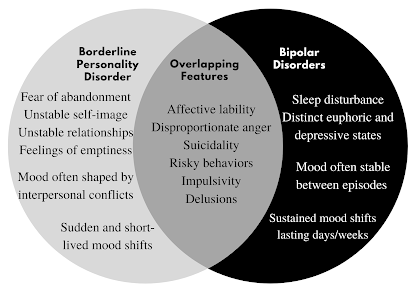MENTAL HEALTH AWARENESS MONTH No.3 BPD
What are the key differences between the disorders?
When a person with bipolar disorder is not in a manic or depressive episode, they demonstrate stability that the borderline personality does not show. If a bipolar person is between episodes, they can function pretty well in the world. They can have in-depth relationships that might be disturbed by their periods of illness, but when they are not experiencing episodes, they have a stability that you do not see in the borderline person.
Bipolar disorder is more rooted in the biology of the nervous system and more responsive to medication. Borderline pathology strongly involves the psychological level of the mind – the way meaning is generated – in addition to the biology of the brain and nervous system. A more biological condition like bipolar lacks these deeply rooted psychological aspects, or ways of seeing the world and perceiving the self and others, that characterizes borderline disorders.
Mood swings of bipolar disorder are more random and less related to events than those of borderline. Those with bipolar might have a hair-trigger kind of response during an episode, whereas borderline person has a hair-trigger response all of the time.
What is important for people to know?
Each is a serious illness, and those suffering need to seek out the proper treatment. Both illnesses can be successfully treated. Too often, individuals with borderline personality disorder are treated for depression or bipolar, when it is a more complex problem. It is essential for patients with borderline personality disorder to see a specialist. A lot of general therapists do not do a good job with this patient population: It’s like sending somebody who needs cardiac surgery to a general surgeon.



Comments
Post a Comment